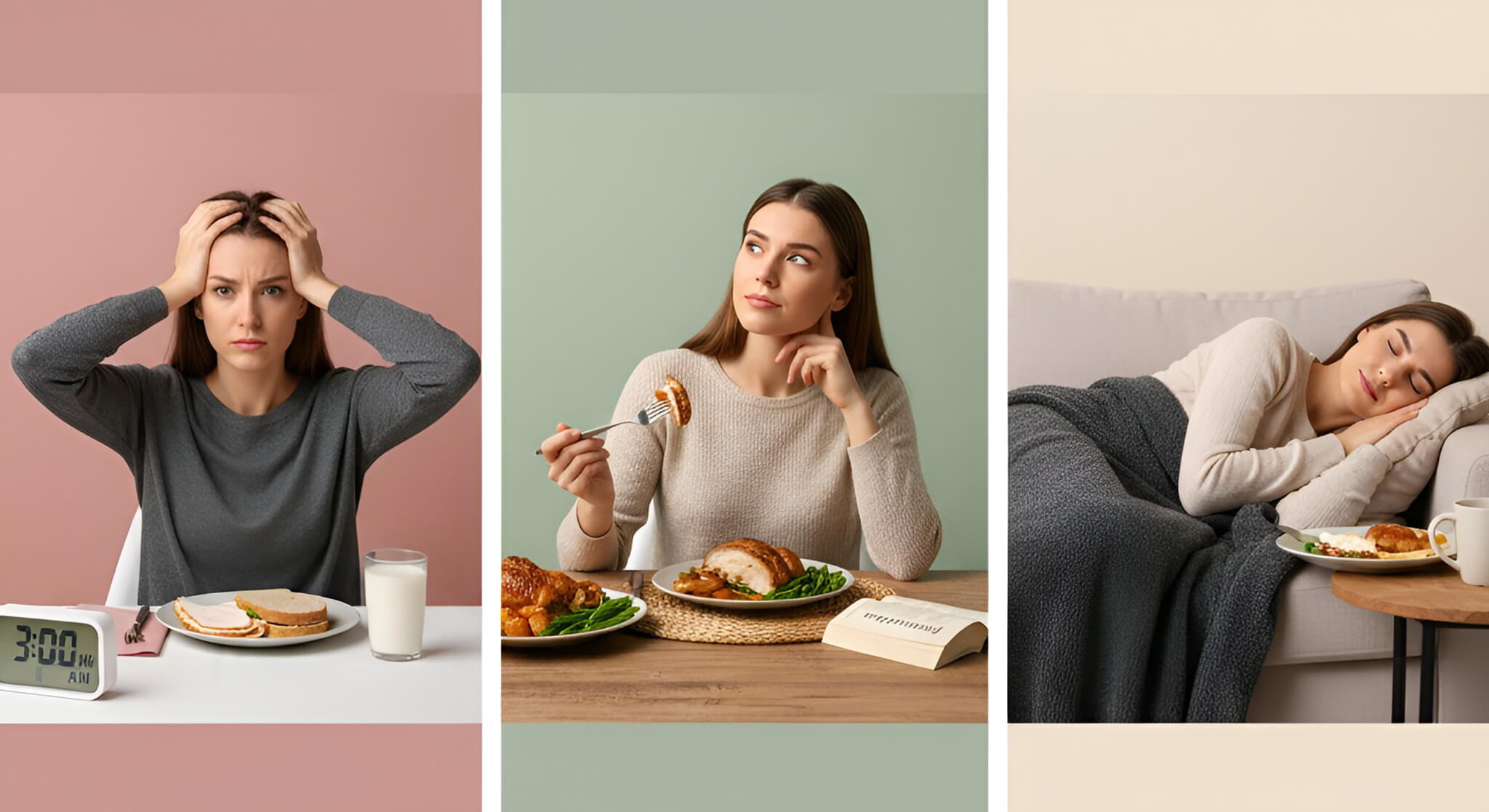Do Tryptophan-Rich Foods (Like Turkey) Really Make You Sleepy
Table of contents
The Great Thanksgiving Myth: The Turkey Coma
It’s one of the most famous food legends in modern culture: after a big Thanksgiving dinner, you feel an overwhelming, irresistible urge to nap. The culprit, as everyone knowingly declares, is the tryptophan in the turkey. It has become a convenient and scientific-sounding explanation for our collective post-feast fatigue.
But is this single amino acid really powerful enough to send an entire dinner party to the couch? Or is the turkey taking the fall for something else entirely?
We’re diving into the fascinating brain science behind tryptophan to separate the nutritional fact from the holiday fiction. The truth might change how you think about your pre-bed snacks forever.
The Science: The Tryptophan-to-Sleep Pathway
First, let’s look at the theory, which on the surface, makes perfect sense.
From Amino Acid to Sleep Hormone
Tryptophan is an essential amino acid, which means it’s a building block of protein that your body can’t produce on its own; you must get it from food.
Its claim to fame is that it is a precursor to other important neurochemicals. In your brain, tryptophan is converted into serotonin, the “happy” neurotransmitter that helps regulate your mood. Then, as evening approaches and the light fades, your brain converts that serotonin into melatonin, the “sleep” hormone that governs your sleep-wake cycles.
So, in theory, the logic seems simple: more tryptophan should lead to more serotonin, which should lead to more melatonin, which should lead to more sleepiness. But there’s a major plot twist.
The Plot Twist: The “Bodyguard” at the Brain’s Door
The Blood-Brain Barrier is a Bouncer
Your brain is protected by a highly selective security gate called the blood-brain barrier. It’s like a bouncer at an exclusive club, controlling what gets in and out. Tryptophan can’t just walk in; it has to be escorted across by a specific transport molecule.
The problem is, tryptophan has a lot of competition. When you eat a protein-rich food like turkey, your bloodstream is flooded with all kinds of amino acids, and they are all lined up, competing for the same ride into the brain. Tryptophan, being a relatively scarce amino acid, almost always loses this competition.
The Carbohydrate “Secret Pass”
This is where the real culprit of the Thanksgiving coma comes in: the carbohydrates. When you eat a meal rich in carbs—like mashed potatoes, stuffing, sweet potato casserole, and pie—your body releases a surge of insulin.
Insulin’s main job is to clear sugar from the blood, but it also helps escort most of the other amino acids out of the bloodstream and into your muscles. However, it leaves tryptophan largely untouched. With all its competition cleared away, tryptophan now has a VIP, express pass into the brain, where it can finally be converted into sleepy-time serotonin and melatonin.
The Verdict: Don’t Blame the Turkey
So, is turkey the real sleep-inducer? No.
Turkey does contain tryptophan, but so do chicken, cheese, nuts, and seeds—often in similar or even higher amounts. The real reason you feel so sleepy after a big holiday meal is a combination of factors:
- The Massive Carb Load: The huge amount of carbohydrates you eat with the turkey is what facilitates the tryptophan getting to your brain.
- The Sheer Volume of Food: A very large meal diverts a significant amount of blood flow to your digestive system to manage digestion, which can cause a feeling of lethargy and sleepiness.
- The Holiday Effect: Other factors like alcohol, the social exhaustion of a big gathering, and the general relaxation of a day off all contribute to the famous “food coma.”
The “Smart Sleeper’s” Snack: The Real Tryptophan Trick
You can, however, use this science to your advantage as part of your night routine.
The Winning Combo
To actually use tryptophan to help you feel sleepy, the key is to eat a small, carb-and-protein snack about an hour before bed. The carbohydrates will provide that “secret pass” to help the tryptophan from the protein reach your brain and begin the conversion to melatonin.
Perfect Bedtime Snack Ideas
- A small bowl of oatmeal with a handful of almonds.
- A banana with a spoonful of peanut butter.
- A few whole-grain crackers with a slice of cheese or turkey.
This “smart snack” strategy is a perfect example of fitting wellness into a demanding schedule. It’s a small, intentional choice that supports your body’s natural rhythms. It demonstrates that we are women who prioritize health even on the busiest days, using science to work smarter, not harder, for our well-being.
A Final Thought: Knowledge is Your Best Sleep Aid
The “turkey makes you sleepy” myth is a classic case of correlation, not causation. The tryptophan is a part of the story, but the carbohydrates are the real main character.
By understanding this simple science, you can make smarter food choices to support your body’s natural production of melatonin. It’s a powerful, natural strategy to help combat insomnia, promote deep sleep, and improve your overall stress & health.
While mastering your pre-sleep nutrition is a key strategy, it’s often only one part of a successful sleep toolkit. Creating a comprehensive, multi-sensory bedtime ritual can significantly enhance your body’s ability to wind down. For those who find that nutrition alone isn’t solving the puzzle, exploring the power of scent can be a game-changer, as seen in Ava’s story: how she overcame years of insomnia with aromatherapy by using specific calming fragrances to signal to her brain that it was time for rest.






